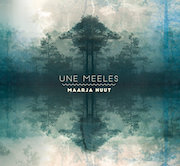Reviewing a record can be a strange experience, requiring a number of gambits to get precisely what you want to say about your own listening experience down in print. Prep work may involve a bath, a walk, a serious bout of ironing maybe, or a good booze-up. All of these have proved useful preludes to sweating out some passable copy at the kitchen table.
The run up to reviewing Maarja Nuut’s new record Une Meeles has been very different. Despite thinking I haven’t played it at all, or done anything conscious in terms of “preparation” prior to this article, I find myself humming odd snatches of a refrain or being confronted with a powerful sense of the presence of one of her songs; completely unawares. I hardly feel like I’ve listened to it. And yet, I think I have played it constantly since I first got it. To hark back to Julian Cope’s review of T-Dream’s Zeit in Krautrocksampler, this record just takes over space, without really being noticeable.
What makes Une Meeles so special is that Maarja Nuut makes utterly compelling, hypnotic music in the simplest of ways. The music is absurdly basic; lacking any frills or vaudeville trickery. And there’s a palpable sense that Nuut has no interest in actually singing these songs to anyone, except herself. She seems to be channelling memories, stripping away her own ego to get to the heart of the matter. And because of that sense, the listener never feels Une Meeles is a bombastic record. Even though tracks like the opener ‘Kargus’ and ‘Eeva & Maarja Labajalg’ are tough, sturdy vehicles for her muse, sure of their staying power and insights.
Maarja Nuut’s practice of stripping things down to the most basic of musical propositions has, conversely, allowed the album to inhabit a colossal headspace. The relentlessly hypnotic, repetitive qualities that drive brilliant cuts like ‘Hobusemäng’ seem to be drawn from a restless never-sleeping otherworld. After a few spins of Une Meeles (especially when tuning into tracks like ‘Kellatoas’) you become aware that all ideas of modern time, aren’t that welcome or really necessary. This isn’t really surprising as Nuut has admitted that her mission is to explore the emotional spaces the border on the conscious, waking state. A track like ‘Siidisulis Linnukene’, for example, seems to form itself out of Nuut’s speculations whilst you listen. As if in recompense, our spatial bearings are marked out by a steady, “agrarian” sense of rhythm that then takes a number of diverse forms. These strange, incredibly simple rhythms exert a continual, and heady spell over the listener. Sometimes the spell is conjured up by patterns set up in the fiddle, sometimes it takes a cue from Nuut’s own foot stomping or hand clapping, or, most noticeably, through looped vocal lines; as in the spectral ‘Õdangule’.
It’s fair to say that Une Meeles has a seriously “heavy” side to it. I mean heavy in the way Neds use the word, a thing of worth, a thing to brag about. Or heavy in the way hippies used the term whilst lighting up another joss stick to keep the mice away from their velvet loons. I think it passes as a heavy record in the way Nick Drake’s 5 Leaves Left, or Irén Lovász and Teagrass’s Wide Is The Danube are “heavy” records; bejewelled caskets that should be opened only now and again as a treat. Even if – on a basic level – Une Meeles sounds like a dreamy Estonian girl with a fiddle and a few loop effects and a bookful of lyrics about nature and love and the spirit world. Even if the cover picture is about as inspiring as a trip to the dry cleaners (we get a picture of a dank patch of Estonian forest, in the most unattractive shade of grey-green going).
And I don’t know quite why but Nuut’s work has a lot in common with Klara Lewis’s music. These are two artists whose sounds couldn’t be more different on the face of it (though the incredibly spooky ‘Kiik Tahab Kindaid’ nods to Lewis’s sound world now and then). Maybe it’s because both artists share a feeling of “High Romance”; the idea of romance as a fearlessly emotional concept, one that is self-confident and self-absorbed; lost in the reflection of its own image. Like Lewis’s work, the music on Nuut’s LP has the rare quality of being able to quickly and astutely map out its own presence. And both Lewis’s and Nuut’s indifference to anything but their relationship with their own creations is incredibly inspiring and giving.
I really, really don’t want to convey that Une Meeles is one of those records where the artist tries to be mystical and sweet yet possessing a deep, or profound, or magical side. That sort of unplugged-Aga-saga contrivance has pretty much wrecked everyone’s perception of folk or singer songwriting; probably for ever. Rather, Une Meeles feels like everything and nothing. Like one of the child ghosts in MR James’s Lost Hearts, the record floats about on the periphery of our vision. And in that respect the record’s title, translated from Estonian as “in the hold of a dream”, is a perfect summation of its content.


